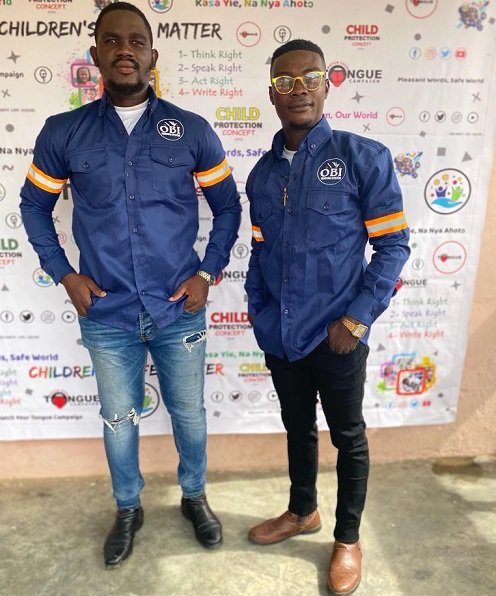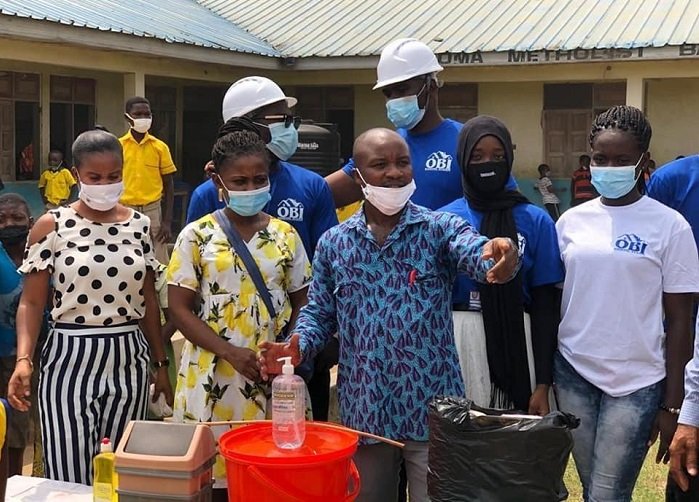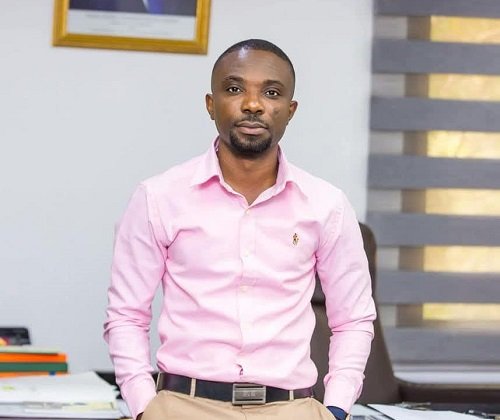Hot!
Vocational education key to financial liberation – OBI tells youth

Technical and vocational skills acquisition isa long-term profession to empower the youth who venture into Technical and Vocational Education and Training (TVET).

This, according to Mr. Okai Boamah Isaac popularly known as OBI, the Chief Executive Officer of OBI Roofing Systems, would serve as an intervention to bridge the unemployment gap among Ghanaian youth and also act as economic intervention for the nation as a whole since it would generate revenue for the country. 
Mr. Okai said these when The Spectatorinterviewed him on the genesis of his career and personal life in Accra.
The CEO has trained many youth to acquire the skills and knowledge in good and quality roofing installation which has made such individuals become independent workers contributing their quota to national development.
Background
In his quest to make life worth living, and surmount every impediments on his way, Mr. Okai made conscious efforts by rising through the ranks of being a worker at various roofing companies, and now a CEO of his own company.
Mr. Okai who hails from Kwahu-Abetifi, in the Eastern Region and lived in a village called Hweehwee also at Kwahu was brought up by his parents, Madam Adwoa Serwaa Sabina a native of Kwahu-Abetifi and Mr. Philip Havor from Ada in the Greater Accra Region.
He lived with five siblings, a brother and four sisters Mr. Okaiis the first born and lived at Hweehwee from 1994 to 2000.
Education
He had his elementary school education at Hweehwee but the family later moved to Nkawkaw and settled at Atta ne Atta a suburb of Nkwakaw.
He wrote the Basic Education Certificate Examination at Nkawkaw Kuma Anglican Basic School, and enrolled at National Vocational Training Institute (NVTI) at Kokomlemle in Accra.
He did extensive courses alongside his practical works in roofing and Construction, Building and Construction Management, Carpentry and Joinery and Electrical Technician or House Wiring.
Vocation
After his technical and vocational training at the institute, Mr. Okai worked with DBS Roofing Ghana Limited from 2013 to 2015 as a roofing installer.
In 2013, he worked with Big Bond Roofing Company at Industrial Area, Accra, till 2015 and moved to work with Tompoo roofing at Kasoa in the Central Region from 2016 to 2018.
Mr. Okai in 2018, established OBI Roofing Systems where he has been managing and operating his own roofing company to meet the needs of the Ghanaian builder in any type of building.
“The Ablekuma Point 5 branch of the OBI roofing systems has an engineer as its manager and because of that it has aided the company to move at a pace which puts it above other companies in terms of value for money work delivery”, Mr. Okai told The Spectator.
Training Centre
In order to increase the interest of more youth in technical and vocational training, Mr. Okai has set up a training centre to help the youth acquire skills better of their lives.
He lamented that there were a lot of people who had been to technical schools for three years to do welding among other courses but when “you ask them to make a table, they are unable to do the practical works”.
“So at OBI Technical Training Centre, we give you the practical aspect of what you did in school as you learn the estimations and do the real work as you are supposed to do in satisfying your clients with the best work they require from you”, he said.
Since his speciality is in roofing, the trainees get the knowledge on how to install any type of roofing sheets at OBI Technical Training located at Ablekuma Bokoboko, in the Greater Accra Region.
“The training centre is open to men for now and as time goes on, we’ll know how to structure things and involve women because we do practical works which need physical strength to carry equipment at the site”, he observed.
Message to the Ghanaian Youth
“My advice to the youth is that they should use their time profitably on valuable things, by investing our time on things that would be of importance to our lives and eschew irrelevant things that would put our lives at stake like bet staking, among others.
“Ghanaian youth should try as much as possible to use their hands to do something because we use our hands and knowledge to do everything here on earth to succeed so if we do not use knowledge, we would later lament that there is no job in the country but there are actually a lot of jobs in the country which require skills and technical know-how, but because we do not have the knowledge about a particular job, we say there is no work”, Mr. Okai said.
By Alfred Nii Arday Ankrah
Hot!
Education free, but parents have roles to play – Anloga DCE

Madam Sandra Seyram Kpedor, the District Chief Executive (DCE) of Anloga in the Volta Region, has emphasised the importance of parental involvement in children’s education, stating that education is free, but parents need to do more to support their children.
She said parents, teachers, and students must be involved in addressing the challenges facing the district’s education sector, particularly the poor Basic Education Certificate Examination (BECE) results.
Madam Kpedor outlined some key roles parents should play to promote their children’s education, including providing a conducive learning environment, monitoring their children’s progress, and supporting teachers.
The DCE highlighted some challenges the district faced such as inadequate infrastructure and a shortage of teachers, which have also contributed to the poor BECE results and called on well-to-do parent to help solve the situation through and other supports.
To address the issues, she also announced that plans have been taken to utilise the district’s common fund to implement educational projects, such as constructing school blocks and teachers’ bungalows at Sodzi community, and 2-unit classroom blocks each at Akplorwutorkor and Tegbi-Afedome respectively, among others.
Madam Kpedor also noted that her office had earlier notified the Ministry of Education to deploy more teachers to the area to improve teaching and learning, and encouraged students to work hard and strive for excellence, and work beyond their limit to succeed.
“To my wonderful and beautiful girls, you have to know it clear that women and girls have equal opportunities to compete with men for greater achievements,” she indicated.
The DCE cited her own achievement as a testament to the fact that women can excel in leadership positions, alongside Vice President Nana Jane Opoku-Agyemang, and stressed that girls were no longer limited to domestic roles but can pursue their dreams and become leaders.
Additionally, she mentioned that a meeting was held earlier with assembly members, and other stakeholders to address the district’s educational challenges and improve academic performance.
She promised that the district’s education oversight committee and stakeholders would work together to address the challenges and improve the district’s BECE results and called for parental involvement and support to boost the district’s education sector for children to chase their dreams to become future leaders for the success of the district and the nation.
She urged parents not to leave everything to the government but rather help in the provision of some necessary materials such as textbooks, exercise books, pens, pencils, food, and guidance to children for the successes of young learners. –GNA
Join our WhatsApp Channel now!
https://whatsapp.com/channel/0029VbBElzjInlqHhl1aTU27
Hot!
Dennis Miracles Aboagye criticises NDC’s “no fee stress policy” implementation

The spokesperson for Dr. Bawumia, Dennis Miracles Aboagye, has criticised the implementation of the NDC government’s No Fee Stress policy, arguing that the programme has failed to deliver on its core promise.
According to him on Starr fm, the policy, which was introduced to ensure stress free payment of fees for level 100 tertiary students, has rather turned into what he described as post stress support.
He explained that students are required to pay their fees first before applying for reimbursement, a situation he believes defeats the purpose of the policy.
He questioned claims by government officials that the policy has been successful and that citizens are happy.
In his view, such claims do not reflect the lived realities of many Ghanaians. He stressed that while some people may appear satisfied, many others continue to struggle.
Dennis Miracles Aboagye pointed to the situation of trained teachers and nurses who have been picketing for nearly six months, demanding employment.
He noted that government responses suggesting it cannot accommodate all of them contradict claims of economic stability.
He further argued that economic indicators such as a stable currency mean little to people who are unable to secure jobs or access promised support.
He observed that telling an unemployed teacher or a struggling student that the cedi has strengthened does not address their immediate challenges.
On the issue of tertiary education, he maintained that no level 100 student benefited from stress free fees in 2025, despite the policy being announced.
He added that in 2026, students have already reported to school without receiving the promised support.
He insisted that asking students to pay fees first and seek reimbursement later amounts to support after hardship, not stress free education.
According to him, this approach goes against what was promised during the policy announcement.
Dennis Miracles Aboagye questioned why a government that presents the economy as strong is unable to fulfil what he described as simple and clear promises.
He added that there is a fundamental problem with the way the economy is being managed and indicated that he is prepared to explain his position further.
By: Jacob Aggrey







